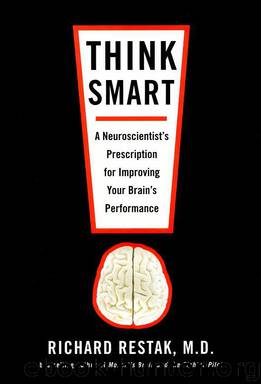Think Smart A Neuroscientist's Prescription for Improving Your Brain's Performance by Richard Restak

Author:Richard Restak [Restak, Richard]
Language: eng
Format: epub
Tags: Nonfiction
ISBN: 9781101050453
Publisher: Penguin USA, Inc.
Published: 2014-10-12T21:00:00+00:00
Spell More Challenging Words
In order to learn a new word, it’s necessary to spell it correctly. In an age of spell-checkers, finely honed spelling skills seem less important to some people than in earlier times. But there are more important reasons for enhancing your spelling prowess than simply limiting your dependence on not-always-available spell-checks. Spelling engages and stimulates several language-related brain areas and circuits. And spelling forces you to focus and mentally “see” the word prior to speaking it or writing it down. Finally, learning new words brings about brain changes according to the degree of difficulty involved in spelling the word: the greater the difficulty, the harder the brain has to work, as measured by greater brain activation.
If you’ve ever watched contestants competing in the National Spelling Bee, you may have observed on their faces a look of effortful strain whenever they’re asked to spell words in which the pronunciation provides little information about the correct spelling, such as céilidh (pronounced KAY lee), referring to a traditional Gaelic social dance in Ireland, Scotland, and Atlantic Canada. Words like that are difficult because the contestants must activate a different part of the brain in order to spell an irregular word correctly. With a regular word, for example scan, the sound corresponds closely to the arrangement of the letters. Words like céilidh or yacht, for which the sound does not closely match the spelling in English, activate areas of the brain that process word meaning, such as the frontal and parietal lobes, which process printed text. Regular words, in contrast, preferentially activate part of the superior temporal lobe devoted to the spelling of words in which the sound corresponds closely with the letters.
In Jeffrey Blitz’s documentary movie Spellbound, a parent of one of the finalists in the National Spelling Bee offers this formula for correctly spelling either a regular or an irregular word: “Start by learning the meaning of the word, the language of origin, and the root of the word. Use the word in a sentence, repronounce the word, and review the meaning of the word. Then spell the word to yourself, match it with the sound that you’re going to make when you speak it. After repronouncing the word one last time in your head, spell it slowly out loud.”
Spellbound, as well as Myla Goldberg’s 2001 novel Bee Season, have sparked intense interest in spelling bees. In 2006, 2007, and 2008, ABC provided live prime-time coverage of the final rounds of the Scripps National Spelling Bee. As a result of this keen interest in spelling, adults now want to be included in the fun and competition. The National Adult Spelling Bee is held yearly in Long Beach, California. The rules are similar to those of the Scripps Bee except for the age of the contestants. Anyone older than sixteen (the cutoff point for the Scripps Bee) is eligible to travel to Long Beach, pay the ten-dollar entry fee, and compete.
I was curious about the backgrounds of the winners of the 2006 and 2007 National Adult Spelling Bee, so I contacted them.
Download
This site does not store any files on its server. We only index and link to content provided by other sites. Please contact the content providers to delete copyright contents if any and email us, we'll remove relevant links or contents immediately.
| Anatomy | Animals |
| Bacteriology | Biochemistry |
| Bioelectricity | Bioinformatics |
| Biology | Biophysics |
| Biotechnology | Botany |
| Ecology | Genetics |
| Paleontology | Plants |
| Taxonomic Classification | Zoology |
Sapiens: A Brief History of Humankind by Yuval Noah Harari(14363)
The Tidewater Tales by John Barth(12649)
Mastermind: How to Think Like Sherlock Holmes by Maria Konnikova(7320)
Do No Harm Stories of Life, Death and Brain Surgery by Henry Marsh(6933)
The Thirst by Nesbo Jo(6930)
Why We Sleep: Unlocking the Power of Sleep and Dreams by Matthew Walker(6699)
Life 3.0: Being Human in the Age of Artificial Intelligence by Tegmark Max(5545)
Sapiens by Yuval Noah Harari(5364)
The Body: A Guide for Occupants by Bill Bryson(5079)
The Longevity Diet by Valter Longo(5057)
The Rules Do Not Apply by Ariel Levy(4957)
The Immortal Life of Henrietta Lacks by Rebecca Skloot(4571)
Animal Frequency by Melissa Alvarez(4459)
Why We Sleep by Matthew Walker(4433)
The Hacking of the American Mind by Robert H. Lustig(4375)
Yoga Anatomy by Kaminoff Leslie(4358)
All Creatures Great and Small by James Herriot(4310)
Double Down (Diary of a Wimpy Kid Book 11) by Jeff Kinney(4260)
Embedded Programming with Modern C++ Cookbook by Igor Viarheichyk(4173)
